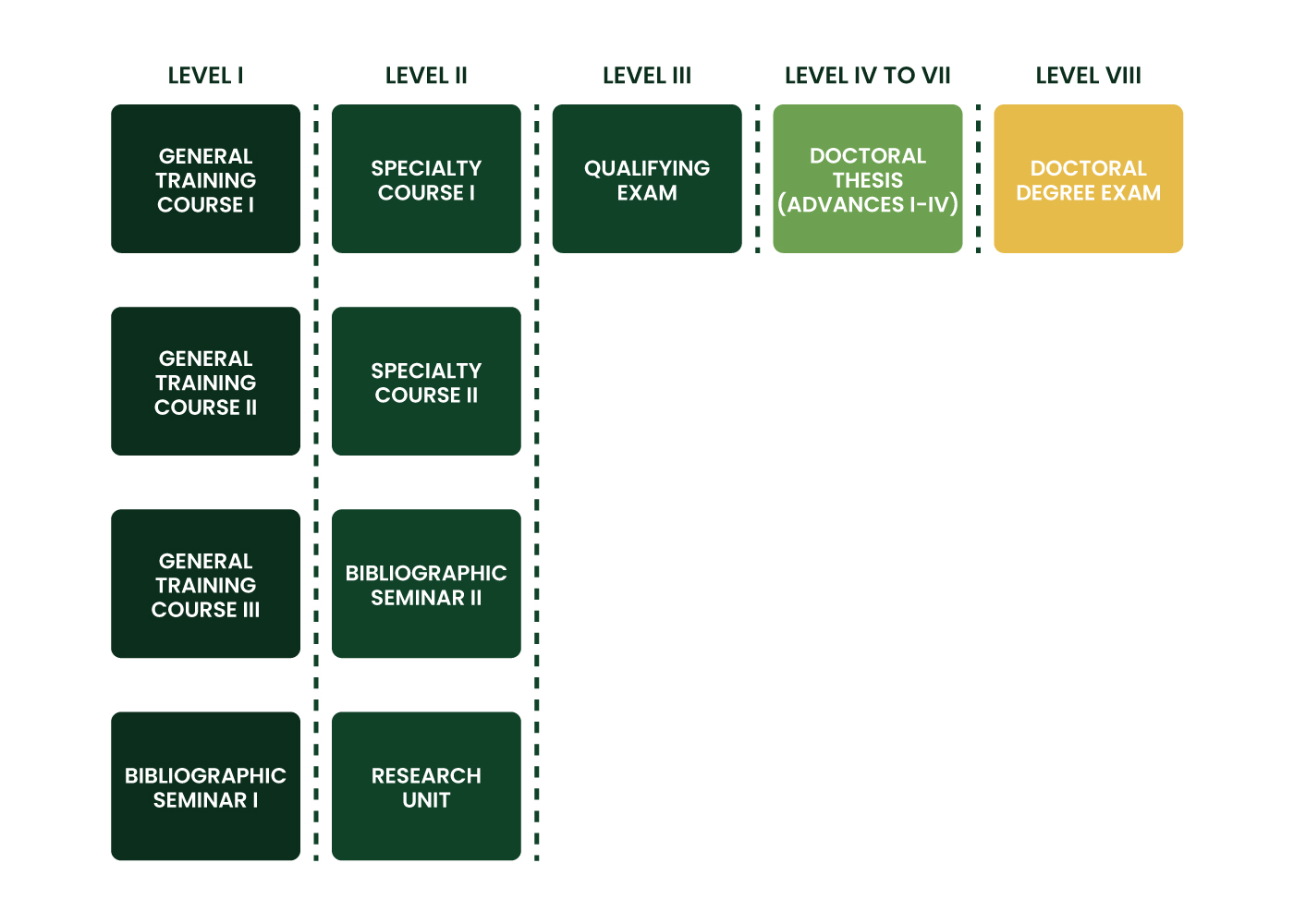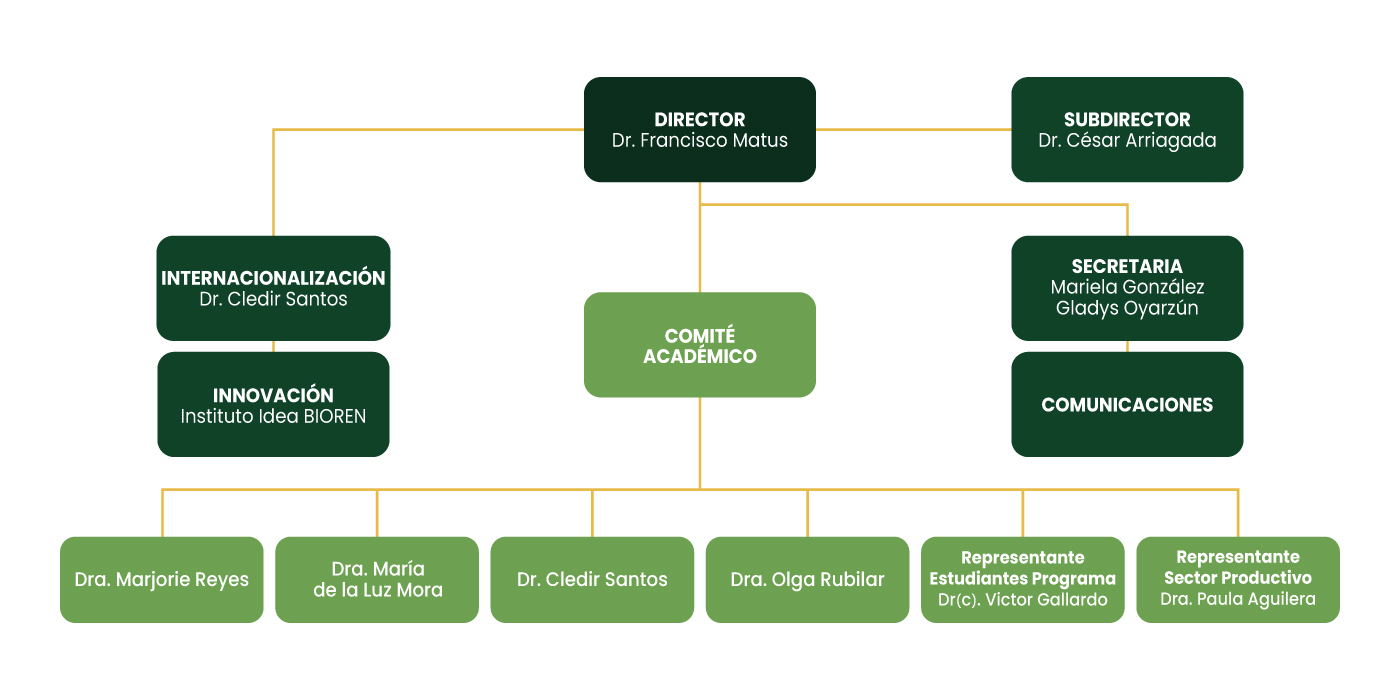Program
About us
The Doctorate in Natural Resources Sciences is a graduate program of the Universidad de La Frontera, whose creation dates back to April 24, 2001 by Exempt Resolution No. 0602.
It is the result of the union between the Department of Chemical Sciences and Natural Resources, the Department of Chemical Engineering and the Department of Agricultural Production of the mentioned institution.
Since 2010 we have had the collaboration of the BIOREN – UFRO technological platform, thanks to which we have strengthened the scientific productivity of our program.
In the last 7 years the number and impact of WoS publications generated has increased, experiencing an increase of 13.4 times compared to the beginning of the second accreditation of the program in 2009.
To train highly qualified researchers in sciences with an integral and multidisciplinary vision in diverse fields, such as biology, microbiology, physical chemistry of soils and environment, plant nutrition and physiology, environmental chemistry and biotechnology, and ecological chemistry of terrestrial and aquatic systems.
Currently, the program’s emphasis is on bioprocesses for sustainable agriculture, biotechnology in agri-food production, waste management, bioenergy, renewable energies, with special emphasis on metagenomics and metaproteomics.
- Soil and Environmental Sustainability
- Plant Nutrition and Physiology and Agri-Food Safety
- Environmental Biotechnology, Ecological Chemistry and Bioproducts
- Water Resources, Environmental Ecology and Valorization of Agroindustrial Wastes
The profile of the selected students entering the Ph.D. program in Natural Resources Sciences will be professionals with a professional degree or academic degree of: Bachelor’s or Master’s degree in Chemistry, Biology or Biotechnology, Biochemistry, Agricultural Engineer, Forestry Engineer, Environmental Engineer, Engineering graduates or equivalent professional degree. It is recommended that students have a particular interest in areas related to natural resources and the environment and demonstrate motivation for the study of natural resource sciences.
The PhD in Natural Resources Sciences is a researcher with a comprehensive training in natural resources sciences in the context of environmental sustainability, with solid competencies to (1) develop science, technology and innovation oriented to the conservation of natural resources and (2) disseminate knowledge to the scientific community and society in general. He/she has a multidisciplinary background in the physicochemical, biological and microbiological processes associated with natural resources, and their relationship with plant production, conservation, prevention and soil bioremediation, which enables him/her to (1.1) generate original research in the field of natural resources sciences and derived products, (2. 1) manage the publication of scientific articles based on disciplinary knowledge or research results in internationally recognized journals, and (2.2) disseminate their results to specialized and non-specialized audiences, contributing to the valorization of natural resources, environmental care and food security. (2.3) Generate strategies for intellectual transfer and protection to safeguard innovative research results. Also, demonstrate ability to work in multidisciplinary teams, with critical thinking, and evidence of ethics and social responsibility in their professional work. The PhD in Natural Resources Sciences, due to his/her academic background, will be able to generate and/or maintain lines of research and integrate research centers or nuclei in universities, in the private or public sector, at national or international level.


Courses
Students must have a background or previous knowledge related to the subjects of the program. Otherwise, they will be required to take the necessary courses.
Functional and Structural Analysis of Enzymes
Biodynamics and Molecular Pharmacology
Biochemistry and Stress Mechanisms in Plants
Soil and Water Biochemistry and Microbiology
Soil and Environmental Conservation
Organic Matter-Clay Interaction
Chemical and Biological Processes of the Rhizosphere
Soil-Plant Relationship and Mineral Nutrition
Advanced Bioresources Analysis Techniques
Proteo-genomics in Bioresources: From experimental design to bioinformatics analysis.
Bioinformatics applied to the study of microbiomes.
Transcriptomics: basic concepts, application, steps, experimental design

